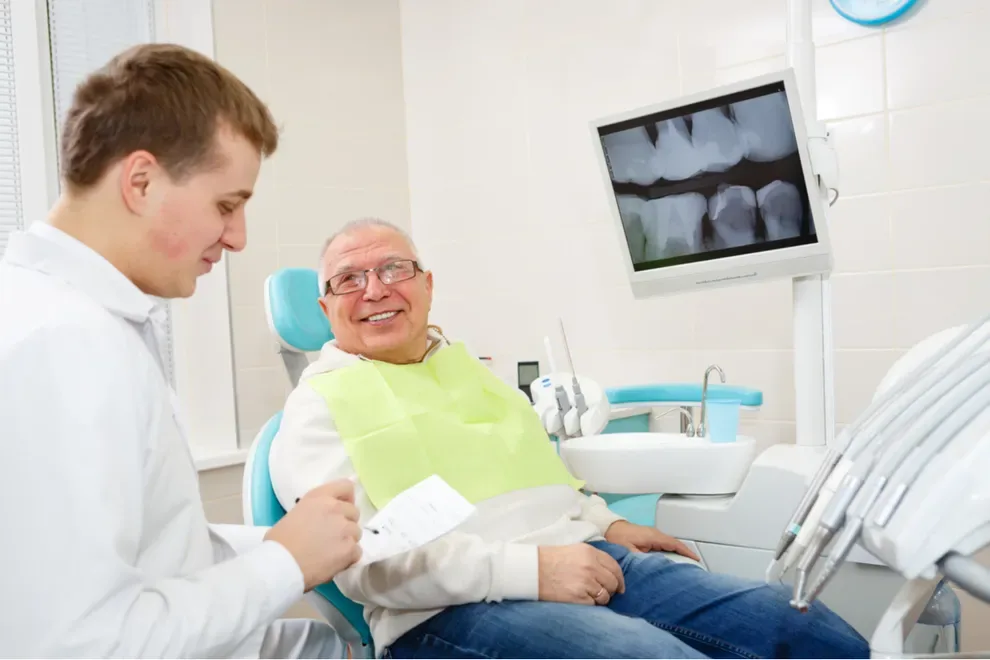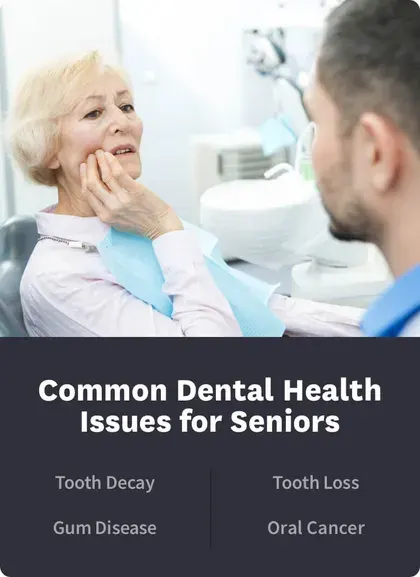Aging & Dental Health.
Table of Contents
- Dental Appointments
- Paying for Care
- Dental Emergency
- Senior Dental Issues
- Oral Health Plan
- Adult Orthodontics
- References
Take care of your teeth, and they'll stay with you forever. We've all heard this saying, but as we celebrate more and more birthdays, we may feel like our teeth are failing to live up to the promise.
According to the Kaiser Family Foundation, 13.5 percent of all Americans 65 and older have no natural teeth at all. Many older Americans keep their teeth, but their smiles are riddled with cavities and plaque.
It doesn't have to be this way.
In this guide, we'll discuss:
Dental appointments. Seniors should have regular well-care visits, and some oral health symptoms should prompt you to make an urgent appointment.
Paying for care. Medicare and Medicaid probably won't cover your dental bills, but you have other options for coverage.
Dental emergencies. When unexpected issues crop up, quick at-home care can save your teeth.
Common dental health issues. Anyone can struggle with oral care, but some problems tend to appear in seniors more than younger people.
Daily routines. Toothbrushes, floss, and mouthwash remain critical oral health tools. But you'll need to adjust your plans if you have some medical conditions.
Orthodontics. Older adults can wear braces or teeth aligners for a straighter smile, and plenty of them do just that.

How many dental appointments do you need?
A dentist is a critical part of your medical team, and you should work together to protect your smile.
There's no set rule regarding appointment frequency, says the U.S. Department of Health and Human Services (DHHS). Some people should go twice per year, others visit more frequently, and still others need only yearly checkups. Ask your dentist to set a schedule that works for you and your mouth.
Signs Your Need an Appointment
Symptoms of illness should also prompt a dental visit, DHHS says. Schedule an appointment if these issues persist for more than two weeks:
Welts on your mouth, lip, or tongue that cause discomfort need an exam. So do spots that are white or red.
Check your mouth, lips, and throat for firm spots that won't disappear.
Difficulty with speech, swallowing, or smiling all merit an exam.
Tongue or mouth numbness should be discussed. So should pain that strikes one ear, even though your hearing isn't affected.
What to Expect During Your Regular Appointment
During a routine appointment, your doctor will check the health of your teeth visually and with x-rays. Your doctor will also discuss your overall health, as some medical conditions take a toll on your teeth.
To move the conversation along, says the American Dental Association, bring paperwork, including:
A List of Current Medications: Disclose the names and doses of all the drugs you're taking, including over-the-counter varieties.
Updated Diagnoses: If your health has changed since your last visit, tell your dentist about your new conditions.
Doctor Contact Information: Your dentist and doctor may need to trade notes about your health and care. Facilitate those conversations with contact data.
Either before or after you chat with your dentist, a dental hygienist will use sharp or motorized tools to scrape away plaque and polish your teeth.
Dental professionals are careful, and they work hard to avoid poking or scraping your gums. But oral tissues are sensitive, and sometimes, even gentle cleanings cause minor injuries. Your mouth is also filled with bacteria just waiting to crawl into a wound and grow.
The American Dental Association says some people should take antibiotics before receiving dental care. If you have heart disease, this could apply to you. Talk with your dentist when you schedule your appointment about this option.
Paying for care: what options are available?
Oral care can be expensive, and chances are, you'll need to plan ahead to pay your bills. Most of the solutions seniors lean on to cover medical expenses just won't work in a dentist's office.
Seniors often can't use these resources to pay for dental care:

Medicare: Medicare doesn't cover most dental procedures, including cleanings. Your coverage also doesn't extend to dental devices, like dentures.
Medicaid: While children get robust coverage for dental health through Medicaid, adults don't. Less than half of all states extend comprehensive dental coverage to adults. Online resources help you understand your state's policies, so you can plan ahead.
AARP suggests that seniors with no Medicare/Medicaid assistance can advocate for lower bills and save money. You could:
Negotiate. Ask for an estimate before the work is done, and offer to pay the total at once, with no payment plan. Some facilities extend a discount for this practice.
Shop around. Visit a dental school near you, or search for low-cost or nonprofit dental organizations in your area.
Look for deals. Scan sites like Groupon for new-patient discount coupons. Or find a provider you like and ask about a new-patient discount.
You could also shop for dental insurance. Companies offer so-called "individual" plans for seniors who already have medical insurance but need a little help with unexpected dental bills. These policies can be surprisingly affordable.
A plan for seniors from Delta Dental, for example, costs $259 per year. Most preventive and diagnostic care is covered fully under this plan.
Regular dental visits, along with a comprehensive at-home care plan, can help you preserve your teeth as you age.
What qualifies as a dental emergency?
When dental issues crop up between appointments, quick self-care can mean the difference between losing a tooth and protecting it for another day.
The American Dental Association recommends these first aid steps for common dental emergencies:
Knocked-out tooth: Try to wedge it back in the socket, and if that won't work, pop it between your teeth and gums.
Cracked tooth: Rinse your mouth with warm water, and use cold compresses to keep the swelling down.
Lip or tongue bites: Rinse with water, and use a cold compress to keep the swelling down.
Foreign objects: Use floss to attempt removal.
After you've tackled at-home care, call your dentist's office for advice or an emergency appointment.
Common dental health issues for seniors.
Your body isn't the same as it was when you were 18. Neither is your mouth. Changes in your metabolism, physical health, and habits can take their toll on your teeth.
Common dental health issues in seniors include:

Among people 65 and older, 96 percent have had cavities, says the Centers for Disease Control and Prevention. About 20 percent have some degree of untreated tooth decay. For some people, that is caused by poor dental hygiene.
Orthopedic issues can make brushing and flossing tough. And memory loss can lead to slipping sleep/wake hygiene habits.
Gums pull back from the teeth with age. A tooth-grinding habit worsens the problem. If left untreated, pockets form between the gums and the teeth. That accelerates tooth decay.
Weakened teeth and missing gums lead to tooth loss. The gap left behind makes remaining teeth vulnerable to shifts, and that can cause even more of them to fall out too.
A long-time smoking or chewing tobacco habit can lead to oral cancers. Most people are around age 62 when they're diagnosed, says the Centers for Disease Control and Prevention.
Oral health issues can also begin in the medicine cabinet. According to the American Dental Association, 90 percent of people 65 and older report using at least one drug each month.
Many of those medications spark dry mouth problems.
Saliva keeps gums lubricated, so they stay in place to protect tooth roots. Saliva can also inhibit bacteria growth. When your mouth is always dry, gums pull back, and bacteria can thrive. This is an ideal environment for cavities to grow.
Your daily oral health plan.
Dental problems are common in seniors. But altering a few basic habits can help to protect your teeth, no matter your age.
Every day, you should:
Swirl a soft-bristle brush, covered with fluoride toothpaste, across your teeth for 2 minutes twice per day. Replace that brush every three to four months, recommends the American Dental Association.
Once per day, move floss between your teeth. Hold an 18-inch piece tightly between thumbs and forefingers, and guide it between your teeth with a gentle rub. Don't forget to floss behind the back of your last tooth, says the American Dental Association.
Carry a water bottle with you, and sip from it throughout the day. Don't wait for the sensation of thirst to prompt you to reach for it.
Talk with your doctor about your medications if your mouth often feels tacky. Lozenges or sugar-free gum may help to stimulate saliva too, experts say. But if you're not getting relief, a change in your medication regimen might be wise.
These products can reach spots in your mouth that your toothbrush or floss might miss. Look for brands that don't contain alcohol, experts say. Those products can make dry mouth problems more acute. Swish the fluid around your teeth every day after brushing.
If you have no oral health routine right now, this list may look daunting. Don't despair. With practice and repetition, these steps become second nature. You'll eventually brighten your smile without even thinking about it.
Can adults use orthodontics?
Crowded, crooked teeth can impair your oral health routine. It's hard to push floss between molars that overlap, and toothbrush bristles can pinch in the overlapping spaces.
Seniors with crooked teeth have options. In fact, experts say more seniors are choosing to visit dental professionals to straighten their teeth, some for the very first time.
Teeth anchor to the jaw via ligaments and bones, and it's difficult to make major adjustments after growth plates close and the body stiffens with age. For some seniors, this means visiting a surgeon is part of the process of straightening their teeth. Surgeons can dig in and change tooth position below the gumline. But for seniors with less severe issues, more traditional solutions might work just as well.
The choice of tool is up to you and your dental health professional. But if your crooked smile is keeping you from living your best life, a consultation could be what you need. Your team might recommend:
Modern braces come with a low profile, compared to their 1970s counterparts. But they still involve brackets and wires. Appliances are glued to your teeth, and in a series of appointments, experts shorten the wire to pull the teeth into place.
Most seniors, and adults of any age, feel they are simply too old for the aesthetics of braces. They don’t want to draw attention to themselves with a mouth filled with metal.
Plastic trays sit on your teeth and push them into a new position. Aligners are smooth, so they don't poke your mouth the way braces do. And they can cause less overall pain than braces too.
You can also remove aligners so it’s easier to keep your teeth clean. At-home aligners are also generally more convenient and less expensive than braces.
The choice of tool is up to you and your dental health professional. But if your crooked smile is keeping you from living your best life, this could be an appropriate solution.

